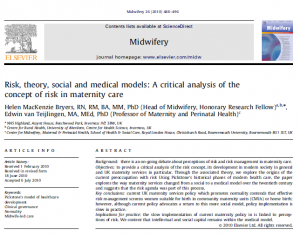In-2- theory Group members delivered a workshop at the CABIV Conference in Vancouver this week on how to operationalise psychosocial theory in collaborative practice and interprofessional education settings to assist practitioners in their critical reflection and problem solving skills in this area. The workshop offered a taster of a knowledge exchange model to be developed through a Canadian Institutes of Health Research (CIHR) grant held by the Universities of New Brunswick, Bournemouth University, University of British Colombia and others. In this model the domains of practitioner knowledge collected through participant narratives overlap with academic theoretical knowledge, in the coproduction of new narratives retold through a theoretical lens. Our aim is the development of pragmatic but theoretically informed solutions to the challenges facing collaborative practice and education. For further discussion, Contact Sarah Hean Shean@bournemouth.ac.uk or Shelley Docuet, sdoucet@unb.ca
/ Full archive
BU paper in top ten in the international journal Midwifery
The paper ‘Risk, theory, social and medical models’ published in 2010 co-authored with Dr. Helen Bryers made it into the top ten most downloaded articles in the past 90 days from the journal Midwifery. See http://www.journals.elsevier.com/midwifery/most-downloaded-articles/
It is also in the top 12 most quoted papers published in Midwifery. This interesting as all 11 papers that have been cited more often are older, i.e. have been in print longer and therefore had more time to be cited.
The Abstract of the paper reads:
Background: there is an on-going debate about perceptions of risk and risk management in maternity care. Objectives: to provide a critical analysis of the risk concept, its development in modern society in general and UK maternity services in particular. Through the associated theory, we explore the origins of the current preoccupation with risk Using Pickstone’s historical phases of modern health care, the paper explores the way maternity services changed from a social to a medical model over the twentieth century and suggests that the risk agenda was part of this process. Key conclusions: current UK maternity services policy which promotes normality contends that effective risk management screens women suitable for birth in community maternity units (CMUs) or home birth: however, although current policy advocates a return to this more social model, policy implementation is slow in practice. Implications for practice: the slow implementation of current maternity policy in is linked to perceptions of risk. We content that intellectual and social capital remains within the medical model. © 2010 Elsevier Ltd.
The full reference this paper is MacKenzie Bryers, H. & van Teijlingen, E. (2010) Risk, theory, social and medical models: A critical analysis of the concept of risk in maternity care. Midwifery 26(5): 488-496.
Prof. Edwin van Teijlingen
Centre for Midwifery, Maternal & Perinatal Health
Graduate School – Exciting Developments!
There have been some exciting developments in the Graduate School and I am writing to you with an update on our activities.
Master by Research
The Graduate School has led the development of a new research degree – Masters by Research (MRes). This is a 1 year research degree programme (governed by Research Degree Regulations, Policies and Procedures and the Code of Practice for Research Degrees) and involves candidates undertaking a research project at a Master’s level of study which will be assessed via submission of a thesis and a viva voce, in line with all BU research awards.
It is anticipated candidates on an MRes will undertake the 1st Review at 3 months full-time study (6 months part-time) to ensure satisfactory progress is being made and would submit their final thesis after approximately 10 months (full-time) with a view to completing within 12 months (full-time).
If the student makes good progress in the first 12 months and a potential PhD programme is identified, instead of submitting a thesis for the award of MRes, the student can apply for transfer to a doctoral degree programme. In these cases, standard procedures and processes for transfer to a doctoral programme will be followed as set out in the Code of Practice for Research Degrees.
The programme was approved by the validation panel on 16 May 2013 and the marketing of the programme has commenced. Recruitment for the programme will start immediately with a view to the first cohort of candidates starting in September 2013.
Professional Doctorate (Research Practice)
The Graduate School are also leading the development of a new Professional Doctorate in Research Practice. The proposed DProf (Research Practice) is a generic award for any subject discipline.
The programme requires candidates to undertake research skills training, to design and initiate research at the forefront of discipline knowledge and contribute to both theory and practice, relevant to subject specific original research and research practice in higher education and other institutions. This programme is also designed with strong emphasis on up-skilling staff in international partner institutions. It will be assessed via the submission of a thesis and a viva voce, in line with all BU research awards. In addition to completing a research skills training programme and carrying out an original research project, candidates will critically analyse and reflect research practice in relation to their own profession, which may result directly in organisational or policy change.
Following the Design Phase meeting, we are revising the Briefing and Resources documentation for validation later this year.
Postgraduate Researcher Development Framework
As you may already be aware, the Graduate School implemented a BU Postgraduate Professional and Personal Development (PPPD) Framework from September 2012, with key components such as Research Skills Training, Professional and Personal Development Planning and International Mobility for PGR students.
The Framework offers a range of training sessions, events (workshops, seminars, conferences, cultural events), activities (including social activities and overseas activities) at Graduate School level, School level, programme (supervisor or tutor) level and through external activities.
Certificates will be issued once sufficient engagement is demonstrated. This certificate will be a supplement to the BU degree award certificate. BU Postgraduate Professional and Personal Development Certificate holders will be highly employable early career professionals with high levels of professional and transferable skills, personal and social responsibility and global perspectives. Students are expected to carry out Training Needs Analyses with their supervisors before engaging with development activities.
To further enhance the programme, new for 2013/14, online e-learning resources will also be made available. The online Research Skills Programme will cover a wide variety of subjects ranging from IP, publishing, ethics, and project management to career planning. The programme will be made available from Sept 2013.
I will be in contact again to bring you more updates. In the meanwhile please get in touch with the Graduate School if you have any questions on these topics
Best wishes
Tiantian
Prof Tiantian Zhang
Head of Graduate School
Researching ICT? This EU conference could be VERY beneficial for you
 More than 4000 researchers, innovators, entrepreneurs, industry representatives, young people and politicians are expected to attend ICT 2013 in November.The event will focus on Horizon 2020 and includes conference presentations, networking sessions, investment forums. This is a key way to gather more info on what to expect under ICT Horizon 2020 calls and to network and gain a collaborative group. You can register for the event here.
More than 4000 researchers, innovators, entrepreneurs, industry representatives, young people and politicians are expected to attend ICT 2013 in November.The event will focus on Horizon 2020 and includes conference presentations, networking sessions, investment forums. This is a key way to gather more info on what to expect under ICT Horizon 2020 calls and to network and gain a collaborative group. You can register for the event here.Festival of Learning – Friday 14th June. Can you believe it is the last day?
 Well, it is hard to believe that it is the final day of the Festival of Learning, and what a two weeks it has been! Fear not, we’ll be writing up all the amazing experiences that have been taking place, and in the meantime you can already find the events recaps on the website. Tomorrow we are packing ready for the Open Day on Saturday, but there are a few things still on – so why not take your picks:
Well, it is hard to believe that it is the final day of the Festival of Learning, and what a two weeks it has been! Fear not, we’ll be writing up all the amazing experiences that have been taking place, and in the meantime you can already find the events recaps on the website. Tomorrow we are packing ready for the Open Day on Saturday, but there are a few things still on – so why not take your picks:
- Digging deeper in Dorset: Big Dig open day
- Social media strategy
- Healthy lifestyles made easy. Fitness innovations: not just for the young
To give you a flavour of what has been going on so far, read on for some inspiration:
Digging Deeper in Dorset: Introduction to Zooarchaeology (animal bones). Reflections by Matt Northam
At the start of this event, Mark Maltby warned us that we’d go home at the end of the day and bore our friends and family with talk about the differences between sheep and dog neck bones, and how to distinguish a cows tooth from a horses; I am pleased (and sad!) to say that he was very right. The day started off with a trip to the Big Dig site for a guided tour from Dr Miles Russell, where we saw an Iron Age settlement, a Roman Villa (a bit of imagination was required for that one as only the foundations are left), and the wonderfully named ‘Wall of Death’ (a photo gallery of the dozens of human remains found at the site). It was great to see the archeology students at work, and we got a chance to look at some recently unearthed skeletons – freshly cleaned by toothbrush – including cats, deer and moles! Afterwards, we headed back to the bone lab to dry off and learn about identification techniques and start to piece together various skeletons. My proudest moment of the day was finding some knife marks on a sheep’s neck, indicating that it had likely been butchered; it wasn’t quite an Indiana Jones-esque discovery but it was enough for me! Dr Ellen Hambleton then walked us though the bone cataloging process which was much more interesting than you might think(!) and then we all had a bit more time to put our newfound skills to the test. All in all, it was a really great day, and well worth braving the weather for! One of the other participants said that it was just like Time Team, but Ellie and Mark were much better hosts than Baldrick and it was great to get a bit of hands on experience rather than just watching it on TV!

The Impact of Technology on Children: Reflections from Emily Cieciura
Over 40 people crowded into a classroom at Winton Primary School to hear academics and practitioners discuss the physical and behavioural impacts that technology can have on our growing children. The morning brought together key research and practical advice to parents and those working with children. They key message is that, with all tools, they can be used for good…. But it is up to the responsible adults around them to ensure that children interact with technology appropriately for their age and stage of physical development. Part of this is applying the boundaries that we have in real life to this virtual one. Practical tips included uses parental controls including DNS controls, where the internet goes through an external filter (so covering all devices used on home wireless) and setting up privacy settings on devices. The session also video clips useful for starting a conversation with a teen or pre-teen including Think before you post. Plentiful resources are available from The Child Exploitation and Online Protection Centre (CEOP) and from providers themselves. This was an insightful and valuable session which was well balanced in its views and vital to all involved with the care of children. As a parent, I’m going to take time to follow these links and do my ‘job’ a little bit better.
Nutrition and Healthier Living: reflections from Julia Taylor
This interesting and engaging event started off with each presenter discussing their specific interests related to nutrition and healthy living. The presenters (Jane, Fotini, Tim, Gillian and Joanne – the core team representing BU’s Nutrition course) included registered nutritionists, dieticians, exercise physiologists, food scientists and psychologists. Following the short presentations, the audience took part in a food myths quiz asking questions such as, ‘is ice cream a good source of dairy’ and ‘is organic food healthier than non-organic.’ Everyone really enjoyed the quiz as it helped to confirm and deny several questions we see in the media on a regular basis. Next, there were several demos to test muscular strength and resting metabolic rate, which the audience found most interesting. The session ended with a healthy eating quiz, so we all got to try full fat cheese and low fat cheese to try to tell the difference. If any of this sounds of interest, the team will be in the Poole House Atrium Friday morning! Fun fact: STRESSED is DESSERTS spelled backwards!
Children’s sleep. What goes wrong? What can we do? Reflections from Eva Papadopoulou
This very well attended event included presentations and interactive workshops, led by experts in children’s sleep across the country. Panel members and individually presenting: Dr Andrew Mayers (BU), Emma Janes (The Children Sleep Charity), Deborah Sugden (Savvy Tot Sleep), and Sue Atkins (Parenting expert). The highly successful children’s sleep workshops at Winton Primary School have received a great deal of national and local media attention (TV, radio and newspapers), which Dr Mayers wanted to share with the public. Also the experts’ work within their own background recently seen at the Channel Four BedTime Live and the appearances in This Morning from the parenting expert, all attributed in a very strong panel, that answered individual queries and also lead to group discussions. The day was a good opportunity for parents, educators and clinicians to find out how to tackle the all too common of getting children to sleep well. The event provoked vibrant discussion throughout the day and looked at tools and techniques that parents and professionals can use. A very positively received event.
Five Go Killing- 12th June: Reflections from Sarah Katon and Natalie Bates
A packed auditorium gathered for the compelling portrayal of ‘Five Go Killing’. This chilling and inspirational performance was written by BAFTA award winner John Foster. This was a unique one woman show that was inspired by a true event that occurred in France but was transposed into the Bournemouth area. This story uncovers a group of five young middle class professionals who embark upon a killing spree involving the murder of old people. This play was gripping and captured the audience. A question and answer session followed where attendees had the opportunity to address the director, producer, writer and actress with questions about the drama.
Motion Capture: Reflections from Emily Cieciura
If you thought VHS and Betamax or CVD vs. Blu-ray was confusing, finding out about all the different methods of motion capture (or Mocap) was an eye-opener. Zhidong Xiao talked us through all the methods currently available and their relative pros and cons in terms of accuracy, space, cost and time. At BU, Passive Optical is used but even this state of the art system still has disadvantages in terms of cost, heavy data usage and set up time. It does though, allow of multiple actors in a convenient space. The most obvious uses are in the entertainment industry for gaming, films and advertising but mocap is also found in the life sciences for sports’ performance analysis, injury prevention and rehabilitation. Use is also made of this technology in performance art, image heritage preservation, robotics and 3D visualisation. The session ended with one of the attendees donning the mocap suit and seeing their ‘stick-man’ image instantly on screen. A very impressive ‘YMCA’ dance ended a very technical but highly enjoyable introduction to this fascinating technique.
Binge Bournemouth?- 13th June: Reflections from Sarah Katon and Natalie Bates
This was a very interactive event held by Will Haydock with Dorset Police as a guest speaker. There were a variety of stakeholders in attendance such as Bournemouth Borough Council, Alcoholics Anonymous, Bournemouth Drug and Alcohol Action Team (DAAT), A & E nurses, The Bournemouth Brief Intervention Team as well as the general public. This was an informative event that dealt with the issue of binge drinking in the local area. This was a great opportunity for these organisations/service providers to debate the issue and to discuss initiatives already in place and potential future actions to combat this problem
Social Sensing: Are You Happy to Work as a Monitor? Reflections from Paul Lynch
Dr Raian Ali’s thought-provoking presentation introduced the concept of Social Sensing and outlined the nature of research happening at BU and elsewhere in this very current area. The session concentrated on what motivates people to participate or to not participate and how best to get feedback from them. The greater part of the session was taken up in a discussion come feedback event enthusiastically engaged in by a very diverse audience. Technology is so present in everyday life now that everyone had a pertinent contribution to make. The discussion crystallised worries around privacy and data usage but equally recognised our apparent willingness to forgo these worries where pleasure or gain is obtained in return. Quite what reward is required to make one say “Yes” when asked “Have you five minutes spare to provide your valuable feedback?” was a trickier question still to be resolved. A very relevant session for all.
CEMP Conversation – recording
Audio extract of today’s CEMP conversation 13.6.13 – a discussion of Allen et al: Work placements in the Arts and Cultural Sector: Diversity, Equality and Access, which was shared by CEMP PHD student Tamsyn Dent.
NB – some of the voices here are via skype.
The next CEMP conversation is on 27.6.13 and the reading will be posted here a week before. All are welcome to attend.
BRIAN Training – 21st June
 We are running two BRIAN training sessions on Friday 21st June 2013. These are hands-on sessions open to all academics and PGR students who want to learn more about BRIAN.
We are running two BRIAN training sessions on Friday 21st June 2013. These are hands-on sessions open to all academics and PGR students who want to learn more about BRIAN.
11:00 – 12:00 Studland House S103
14:00 – 15:00 Christchurch House CG21
If you would like to attend, please email David Biggins at BRIAN@bournemouth.ac.uk to reserve your place.
Festival of Learning – Thursday 13th June – what could you come along to?

Incredibly, we are very nearly at the end of the Festival of Learning. But if you’ve missed out already, fear not – there are some fantastic events that you can still come along to on Thursday. There is a really diverse selection which you can choose from, and don’t worry if you don’t have a ticket – come and see us at the welcome desk and we can point you in the right direction. So, how about your take your pick from:
- Your community matters
- Public engagement in renewable energy and technology issues
- Doppelganger dialogues
- Third sector skills: Visual communication
- The impact of technology on adolescents: Drawing on psychological research to inform practice within schools and the home
- Binge Bournemouth? Making changes in young people’s drinking practices
- Nutrition and healthier living
- The impact of technology on children
- Digging deeper in Dorset: Introduction to ancient artefacts
But what about has already has taken place? As ever, take a look at some of the reflections from the lovers of learning, the Research and Knowledge Exchange team:
Waiting for the Monsoon: Nepal through my lens, a photo and storytelling exhibition of research fieldwork experience in rural Nepal reflections by Eva Papadopoulou
An Interactive event of photographs, artefacts and storytelling of life in rural Nepal – a fieldwork diary of an HSC PhD student, Sheetal Sharma, during the summer monsoon. The camera as a research tool is well documented in disciplines such as anthropology and sociology. The process of photography often leads to uncovering misconceptions. These photographs ‘tell a story’ of the reality of fieldwork, among holy cows, sacrificial goats and cultural practices. Nepal is an ideal setting due to its riot of colour: where the Ancient world thrives in the Modern one. There was a good turn up for this event, which took place Monday 3rd June, with 3 one hour presentations, there was a good discussion during and after the event, with a variety of ages of attendees. Very positive feedback was received for this colourful and exiting presentation.
Social Media Monitoring – reflections from Philip Leahy-Harland
A very well presented and facilitated session with Ana Adi covering the rationale for social media and how to measure what it does. Although the social media landscape has evolved greatly over the last five years, the what, why and how questions to understand how social media can work for you and/or your business remain the same. So what are your objectives, how will you recognise success, what are your key performance indicators, what should you monitor and how frequently should you monitor it? Over the social media landscape there are recognisable and bespoke social media tools. If you are ‘expressing’ then Twitter and blogs will feature highly, if you wish to provide ‘content’ then YouTube and FlickR may be the right tools for you, what about ‘networking’, well there’s LinkedIn and Xing amongst many and if you are firmly in the ‘social’ arena then Facebook, Bebo etc. are for you. Overall, know what you want, how to measure and analyse it. There are many free analytical tools available to you. Facebook has Insight built in for example. External tools such as Google Trends look at trends in search terms (who, where from, when?). This type of analysis helps identify language used by others as well as common typos which could be used in web site optimisation and marketing. Tools such as Social Buzz and Topsy look at FB, twitter and Google+, but beware such systems are not ‘human’ and capture data based on programming, so sentiment in message analysis can be misleading So what’s good to measure? Well, that is down to you, however there are many tools and approaches, you just need to pick the ones that are right for you.
In attendance was Luke Williams, a very experienced social media ‘geek’ (to use his introduction). Luke works for the RNLI and use many social media tools and outlets covering RNLI HQ and all UK RNLI stations (200+). He spends around an hour a day on analysis and an hour responding. This is a busy role but does offer a guide to the amount of time an organisation could spend using social media effectively.
Fantastic British Council funding for international research collaboration – but with a fast approaching deadline!
 I was really excited to see this week the British Council have launched a new five-year programme to encourage international research collaboration between ambitious young researchers from the UK and eighteen countries around the world. Initially the countries involved are Brazil, Mexico, Colombia, Morocco, Egypt, Qatar, South Africa, Nigeria, Russia, Turkey, Kazakhstan, Azerbaijan, Pakistan, Azerbaijan, Thailand, Indonesia, South Korea, Vietnam and Bangladesh.
I was really excited to see this week the British Council have launched a new five-year programme to encourage international research collaboration between ambitious young researchers from the UK and eighteen countries around the world. Initially the countries involved are Brazil, Mexico, Colombia, Morocco, Egypt, Qatar, South Africa, Nigeria, Russia, Turkey, Kazakhstan, Azerbaijan, Pakistan, Azerbaijan, Thailand, Indonesia, South Korea, Vietnam and Bangladesh.
The call is aimed at ‘leading researchers’ who can propose themes for bilateral workshops to be held in one of these countries which will bring together early career researchers to discuss research and start to build international relationships. The call guidelines and application form can be found here and the deadline is 14 July.
Challenging accepted ‘givens’
Last week, I (Jonathan Parker, Professor of Social Work & Social Policy, Deputy Dean for Research and Knowledge Exchange and Director of the Centre for Social Work, Sociology and Social Policy in HSC) presented a keynote lecture at University Campus Suffolk’s annual conference on social work education and practice last week.
In the lecture, I questioned the increased reliance on practice learning in professional education, reminding delegates – academics and social work practitioners from East Anglia, Essex, Norfolk, Nottingham and Suffolk – that there has been almost uncritical acceptance of this pedagogic methodology demonstrating compliance rather than research-based reflection. I drew on many years of research critically questioning the concept of practice learning to paint alternative pictures of it to the ones promoted by those advocating reform.
I sought to ‘trouble’ the recent reforms of social work education and challenged professional bodies and Government to work together and let recent reforms ‘bed-in’ before attempting further revision. I questioned the anecdotal evidence used to initiate reform as representing political ideology and a means of deflecting attention from other social policy failures rather than indicating a pressing need for change. Using models from organisational sociology and the pursuit of legitimacy through standardisation, consistency and compliance, I called for a continuing questioning and discomforting of ‘givens’, and commitment to searching for best evidence whilst questioning the meanings professionals make of ‘evidence’ and the power relations it constructs. The appeal for intellectually robust resistance to poorly evidenced and politically-motivated calls for reform was well received.
Poland and the Eurozone Conference – September Event
Poland and the Eurozone Conference
http://i.newsletters.bournemouth.ac.uk/cmpimg/2009/11446/1402061_darkpurpleline.png
Date: Thursday 19 & Friday 20 September 2013
Venue: Bournemouth University, Executive Business Centre<http://newsletters.bournemouth.ac.uk/t/8TY-1EC9F-524KYS-K1L9F-1/c.aspx>, BH8 8EB Register for this free event here<http://www.eventbrite.co.uk/event/7034742103>.
Poland is one of Europe’s economic out-performers. The country’s history and geography encourage it to be in favour of deeper European integration. But setbacks affecting the EURO impacted Poland’s European stance with caution. Proposals for pressing ahead with deeper political integration for EMU countries – a step towards a ‘two-speed Europe’ that would leave the Poles outside, have been received reservedly in Warsaw.
The keynote address will be given by Leszek Balcerowicz<http://newsletters.bournemouth.ac.uk/t/8TY-1J6W1-524KYS-M26LA-1/c.aspx> on “Euro: problems and solutions”. Leszek, former deputy Prime Minister, Minister of Finance and President of the National Bank of Poland, is a Professor of Economics at the Warsaw School of Economics.
This conference aims to contribute to discussions on the future shape of economic and monetary union (EMU) and the next steps ahead. Contributions on all aspects are welcome in the form of 300 word abstracts.
We aim to publish a selection of conference papers with the Palgrave/Macmillan’s book series ‘Studies in Economic Transition’.<http://newsletters.bournemouth.ac.uk/t/8TY-1EC9F-524KYS-K1P3H-1/c.aspx>
Please send all submissions by email<mailto:polandconference@bournemouth.ac.uk?subject=Poland%20and%20the%20Eurozone> before 15 July 2013.
Dizzy the dog attends midwives forum

Left to Right: Mandy Williams - Community Midwife, Gay Rogers - Breakfast Host and Hospital Midwife and Luisa Cescutti-Butler, Senior Lecturer (Midwifery)
Every three months hospital and community midwives at Salisbury NHS Trust Hospital attend a forum dedicated to matters relating to Examination of the Newborn (EXON). The aims of the forum are to support healthcare professional undertaking newborn examinations, sharing of experiences/case studies, interprofessional working, maintenance of competence, formulate and review internal processes and peer support for professionals in training. Members consist of midwives, nurses, a consultant Paediatrician and Children’s physiotherapists. BU student midwives are welcome to attend when working with their community midwives and on this occasion two students were present. As unit leader for EXON at BU and one of the link lecturers at the hospital, I chair, coordinate and facilitate the forums, with venues alternating between hospital and community. This month we met for breakfast at a colleague’s home, where midwives were greeted with the smells of freshly brewed coffee and a newly prepared home cooked frittata. Further offerings included fresh strawberries, raspberries, warm croissants, cocktail sausages and quails eggs.
Minutes and agendas are sent out in advance. A standing item is a report from senior children’s physiotherapist Karen Robinson, whose department leads the service for Developmental Dysplasia of the Hips (DDH) in newborns. A recent case was brought to our attention, where a baby had been examined by midwives and doctors and found to have an unstable right hip. The baby was appropriately referred for an ultrasound scan which subsequently found the right hip normal, but considered the left hip abnormal. The Barlow’s and Ortolani manoeuvres used by both professions at the time of the examination had not detected any left hip abnormality. A robust discussion ensured as to the complexities of examining babies for DDH and the difficulties in detecting unstable hips when the manoeuvres used by all professionals were themselves unreliable. However Karen was able to reassure us by indicating that in the seven years of the Children’s Physiotherapy Department leading the DDH service, very few babies had been ‘missed’. Karen also emphasized the significance of caring for babies’ hips in general and the importance of educating parents around their baby’s ‘hip health’. The 3rd year midwifery students are currently taught theory around DDH with opportunities to practice manoeuvres on ‘Baby Hippy’. As facilitator for these sessions I realized that our midwifery curriculum had to include general baby hip health in the first year of the student’s programme. Rachael, a 3rd year student midwife, was in agreement: “the discussion around hip care for newborns was great to listen to. I agree that it would be really beneficial to have a lecture on hip care for students”.

Left to Right: Rachael Callan - 3rd year student midwife, Carol Bremner - Community Midwife, Beccy Seaton-Harris - 1st year student midwife and Fiona White - Community Midwife
On other matters Karen highlighted a number of babies diagnosed with Erb’s Palsy following birth had recently been treated by the department. Various options were offered as to why these babies had sustained these birth injuries, resulting in the forum unanimously agreeing that education around Erb’s Palsy and Brachial Plexus Injuries would benefit all professionals involved with childbirth. Terri Coates, an expert on Brachial Plexus Injuries and a midwife at Salisbury, agreed to arrange a study day with the national Erb’s Palsy Support Group, to be held at either Salisbury Hospital or BU for midwives and students.
There are many advantages in having a regular forum to discuss issues relating to newborn examination. Case studies are presented and debated and education around various topics are provided at regular intervals. The forum also supports midwives from other trusts who are having difficulties with undertaking the examination in their areas. Beccy, the 1st year student midwife had the following to say: “It was very informative. It was good to see community and hospital midwives coming together as a team. I am also interested in learning more about Erb’s Palsy and attending a study day. Learning about general hip care would also be beneficial. The breakfast was lovely too”.
The last bark, I mean word, goes to Dizzy. He gets terribly excited when breakfast is served and runs from one midwife to another hoping for a dropped sausage or at least a titbit from a kind soul. After not having much luck, he eventually settles down and gently snores in the corner of the room.
Festival of Learning – Wednesday 11th June

Well, the weather may now be very reminiscent of a muddy Glastonbury year, but we still have some amazing events lined up for the last three days of the Festival of Learning! Before I give you a sneaky preview of these, I just wanted to share one element of the fantastic feedback that have received in the Festival office. A recent attendee to the Story Stew event emailed: “Just wanted to say my daughter and I found this event to be excellent. Mary had exactly the right balance of humour, learning, participation, adult/child balance. She did an excellent job and really enthused my already avid writer child into wanting to write even more (just not at the moment as she has a broken wrist – made Kira’s day that Mary wanted to sign her cast!) We were really impressed”. Congratulations to Mary Evans for her fantastic event (and all my colleagues that helped the event run smoothly).
If you still haven’t been to an event, why not take a break from marking and come along to:
- Five go Killing
- Social sensing: Are you happy to work as a monitor?
- Rufus Stone the movie: Community screening and feedback
- Engaging the public: Effective public engagement
- Digging deeper in Dorset: Introduction to zooarchaeology (animal bones)
But what about that have happened before? Below are some reflections from the Research and Knowledge Exchange office:
Story Stew – Saturday 8 June, Reflections from Natalie Baines:
Mary Evans led a fantastically fun and entertaining event at BU enjoyed by children and adults alike. A funny poem about smelly dads, which dads in attendance helped to bring to life by acting out different parts, was very well received by their children! Following the recipe for the perfect story, the audience helped Mary with the ingredients to create an amazing story stew and with her they chanted:
Somebody tries
To get what they want
Oh no! What’s in the way?
Rescued now. What happens next?
You’ll have to see-Hooray!
The main principles of story writing were covered in a humorous, light-hearted and exciting way which made for lots of smiling, happy faces on yet another bright and sunny festival day.
Engaging young women with sun safety: the learning from a research study. Organised by Liz Norton. Reflections by Jenny Roddis
This exciting event organised and presented by ‘the sun lady’ (so called by study participants) considered a research study which developed a theory as to why young women adopt the approaches they do to sun safety. The talk focused on the propensity to forget about sun protection and to inadvertently get sunburnt – categorised as slipping up. Although getting sunburnt is perceived as bad (others would laugh at them and it is painful), young women get burnt inadvertently. They also confuse heat with radiation, and if it is windy or cloudy, they are unlikely to realise they can get burnt. They perceive the sun as being hotter abroad, and don’t realise that the sea or a pool – where they go to cool down – actually intensifies the radiation. Contrary to adults’ opinions, young women don’t get sunburnt just because they like to take risks!
How to Self Publish (Staying Solvent and Sane): reflections from Natalie Baines
Valuable advice and knowledge about self-publishing was shared during this event by Mary Evans. The world of self-publishing can be overwhelming with the array of possibilities out there in this digital age. Mary’s lecture helped to address and make sense of self-publishing so that attendees had some valuable information to go away with. The formats of books and e-books were explored as well as options such as printing on demand and publishing your work yourself. The pros and cons of each were highlighted along with the costs and different packages available from companies such as Amazon, Lulu and more. Another informative and entertaining event from the Festival of Learning which was very well received by attendees.
Mobile Momentum, reflections from Natalie Baines:
Elvira Bolat led the first session providing background to the academic understanding of mobile technology, business practice in deploying mobile technology, an overview of the methodological approach and research context along with the results of her research. Leading the second session was guest speaker, Mike Read, from Taptiva, a company who specialise in touch-screen websites. How the mobile experience could be improved was explored and discussed in detail and it was emphasised that user experience should be the focus. Attendees participated in discussions where they exchanged knowledge, experience and their opinions. This event gave a great introduction into the world of mobile technology.
Open access publishing – common minsunderstandings!
 Reflecting on the experience of our recent mock REF exercise I noted that there were some negative views towards open access publishing that were expressed during the process. This is a little concerning considering the UK government is planning to make all outputs arising from publicly-funded research available via open access outlets by 2014 and considering the open access mandates the major research funders have as part of the terms of their grant funding (including the research councils, the Wellcome Trust and the European Commission). In addition, the four UK funding councils are currently consulting with the sector regarding their proposal to introduce a requirement for all outputs submitted to the post-2014 REF exercise to be published on an open access basis, wherever the concept of open access is relevant. As an institution and as individual researchers we need to ensure that we are able to comply with these requirements and that we are able to positively embrace open access publishing.
Reflecting on the experience of our recent mock REF exercise I noted that there were some negative views towards open access publishing that were expressed during the process. This is a little concerning considering the UK government is planning to make all outputs arising from publicly-funded research available via open access outlets by 2014 and considering the open access mandates the major research funders have as part of the terms of their grant funding (including the research councils, the Wellcome Trust and the European Commission). In addition, the four UK funding councils are currently consulting with the sector regarding their proposal to introduce a requirement for all outputs submitted to the post-2014 REF exercise to be published on an open access basis, wherever the concept of open access is relevant. As an institution and as individual researchers we need to ensure that we are able to comply with these requirements and that we are able to positively embrace open access publishing.
I did a bit of research and came across an excellent article by Peter Suber, Director of the Harvard Open Access Project. In the article, Peter addresses the common misunderstandings and misconceptions about open access publishing, many of which we part of the concerns raised during the recent mock REF exercises. I’ve selected the ones I most frequently hear and provided a summary below, and would urge you to read the article in full here – A Field Guide to Misunderstandings About Open Access.
1. “All open access is gold open access” – not at all! Gold open access refers to open access through journals and green open access is via repositories. Suber notes that researchers often overlook the existence of green open access or think they will not be permitted by their publisher to deposit a copy of their paper in an open source repository. At BU we have our own institutional repository, BURO, and BU researchers can add the full-text version of their papers via BRIAN. Suber notes that between 50-70+% of journal publishers give permission for postprint achiving in repositories. BRIAN will check the copyright of the publisher for you and let you know which version of your paper can be added to BURO. Easy peasy!
2. “Open access is about bypassing peer review” – not true! The goal of open access is to remove access barriers, not quality filters. Open access journals can, and usually do, use the same peer review processes, the same standards, and even the same reviewers as traditional print journals. Many traditional print journals offer an open access route as part of publishing in their journal (hybrid publishing).
3. “Authors must choose between prestigious publication and open access” – incorrect! There are two reasons why open access is compatible with prestige: a gold reason and a green one. First, a growing number of open access journals have already earned high levels of prestige, and others are earning it. Do your part to move things along as an editor, referee, reader, and as an author, by submitting your best work to suitable open access journals. In the meantime consider the second reason. Most traditional print journals allow open access archiving, such as in an institutional repository.
4. “Open access makes sense for second-rate work, but not for first-rate work” – again, not true! The idea behind this misunderstanding is this: the best work generally winds up in the best journals, where it has the best chance of being seen. At least it should be steered toward the best journals, where it will have the best chance of being seen. When we add the suggestion that this path doesn’t allow open access, or that open access can’t improve upon it, then an idea that was largely true becomes completely false. It assumes that the best journals are never open access (not true – Nature, Science and IEEE for example all offer open access options); that only journals can deliver open access (not true – green open access); that the best journals never allow open access archiving (not true – see SherpaRomeo, Science for example permits achiving of post-print of the publisher’s PDF); and that open access archiving can’t increase the visibility and impact of work published in the best journals (not true).
Suber notes 20 other common misunderstandings about open access and his article is well worth reading!
At Bournemouth University we are committed to supporting the open access movement and have been running the BU Open Access Publishing Fund for two years now and will continue into 2013-14. For information on accessing the Fund please visit this page – BU OAPF.
We’re interested to hear your thoughts on open access publishing! Have you tried it, are your sceptical, are you a supporter?
Presentations by CIPPM Members in Portugal and Bournemouth – coming up!
On 15-16th July 2013, Professor Ruth Soetendorp, Associate Director of the Business School’s Centre for Intellectual Property Policy and Management (CIPPM), will present a paper titled “Who Cares What Students Think about IP?” at the Seventh Annual Workshop of the European Intellectual Property Teacher’s Network (EIPTN) at University of Lisbon, Portugal. Details about the Conference can be found here

On 19th June 2013, Dr. Jesus Gonzalez will present on the “The Distinctive Function of Authorship” which will take place at Bournemouth University, Executive Business Centre Room EB302. The event will commence at 4 pm.
All welcome!
Festival of Learning – Testament to a Successful Morning (Dr Simon Thompson, DEC Psychology Research Centre)
‘Testamentary Capacity in Dementia’ (03 June 2013 10:00h – 13:00h) – Presentation followed by in-depth plenary session about the complexities of leaving an estate to beneficiaries following a diagnosis of dementia.
‘Dementia’ is an umbrella term used to describe many types of deteriorating diseases – the most common ones are Alzhiemer’s disease, Vascular dementia, and Lewy body dementia.
Many married couples own property as ‘joint tenants’. Upon death, ownership automatically passes to the survivor. If property is owned as ‘tenants in common’, one half of the estate belonging to the deceased is dealt with by their Will. Problems arise when there is no Will, when others make a claim, or when another Will is executed.
‘Testamentary capacity’ is a person’s legal and mental ability to make a
valid Will. There are three premises: Presumption of capacity; Requirements; Proof of testamentary capacity.
It is proposed that the law should allow testators alternative means of satisfying the testamentary capacity standard such as an option to validate a testator’s capacity during their lifetime through forensic assessment measuring cognitive elements of testamentary capacity.
It does not remove the difficulty of knowing the status of person at a specific time line. However, it goes some way to describing a person during their lifetime in terms of mental ability and capacity.
Thompson, SBN (2006). Dementia and memory: a handbook for students and professionals. Aldershot: Ashgate.
Thompson, SBN (2012). Dementia. In SBN Thompson (Ed), Psychology of trauma: clinical reviews, case histories, research (pp169-202). Portsmouth: Blackwell-Harvard-Academic.
Festival of Learning – what could you come to on Tuesday 11th June?! And a round up of what has been happening so far…
 We are now well into the second week of the Festival of Learning – how did that happen so quickly? Despite the amazing weather at the weekend, we had a great turn-out on Saturday with colleagues enjoying learning about how to build the Perfect Sandcastle, Story Stew (it did involve a large stew pot), How to Self Publish (Staying Solvent and Sane), a field trip to Russell Alfred Wallace’s home (complete with nature walk and talk), a theatre performance to help us learn about Russell Alfred Wallace’s life and not to mention over 250 people visiting Bioblitz over in Poole Park. Amazing stuff and the fun continued on Monday… more reflections from my fantastic colleagues in the Research and Knowledge Exchange Office below. Before, we move to them, what do we have happening on Tuesday 11th June? Lots and lots, so take your pick:
We are now well into the second week of the Festival of Learning – how did that happen so quickly? Despite the amazing weather at the weekend, we had a great turn-out on Saturday with colleagues enjoying learning about how to build the Perfect Sandcastle, Story Stew (it did involve a large stew pot), How to Self Publish (Staying Solvent and Sane), a field trip to Russell Alfred Wallace’s home (complete with nature walk and talk), a theatre performance to help us learn about Russell Alfred Wallace’s life and not to mention over 250 people visiting Bioblitz over in Poole Park. Amazing stuff and the fun continued on Monday… more reflections from my fantastic colleagues in the Research and Knowledge Exchange Office below. Before, we move to them, what do we have happening on Tuesday 11th June? Lots and lots, so take your pick:
- The fastest men on no legs: Disability, prosthesis and the role of technology in elite sport – no need to book in advance, come to the Loft at 7pm to hear from our award winning science communicator!
- 20 years of law at BU
- Social media monitoring
- Community cohesion
- Equipping the business leaders of the future
- Engaging young women with sun safety
- Mobile technology: Distraction or touch point in education and professional development?
- An introduction to motion capture
- Intervention in childbirth: What’s wrong with letting women choose?
- Children’s sleep: What goes wrong? What can we do?
So, what has been happening at the Festival so far… my colleagues from RKE provide their reflections:
Power of the placement year: Reflections by Emily Cieciura
Following a networking breakfast, Mark Ridolfo and Linda Ladle outlined the power of the placement to a gathering of local businesses. The benefits to the company and to the placement student were highlighted along with how the scheme works and is supported by BU. The session also included talks by BU students. Attendees also enjoyed the opportunity to talk with BU staff, including key Placements and careers staff, and network with other local companies. To find out more visit BU’s Business Services Webpages (http://bu.bournemouth.ac.uk/business-services/graduate-and-student-recruitment/index.html) and follow links to all the services we offer.
The perfect sandcastle: Reflections by Emily Cieciura
Professor Sandcastle himself (aka Professor Matthew Bennett) told us the enthralling story of sand and introduced us to the big and little ‘sedi-people’ who make up sand, which is especially wonderful along Dorset’s Jurassic Coast. Matthew used the audience to demonstrate the importance of size, shape, friction and water in making great sand. He explained the physics behind making glass sheets stick together with just water and how water can go uphill, revealing how these scientific feats are vital for having fun at the beach. Using samples of local Bournemouth sand, we worked out the best proportion of sand and water to make that perfect sandcastle. Staking his reputation on it, Matthew told us all the secret of the perfect mix but sorry, you had to be there…. Now, where is my ice-cream?
Reading, writing and eye movements, event organised by Sine McDougall and Julie Kirkby, report by Jenny Roddis
Attendees at this well attended event heard about the history of written language, beginning with pictures and including the English language (did you know that yacht was spelt yot until the advent of the printing press in the Netherlands?). Consideration was also given to the future of English, which is changing as a result of text messaging, emails and Internet chat rooms – should we be able to spell however we wish? Individuals then separated into groups, where they heard about research using the eye tracker and assessing reading skills. An engaging final discussion was held about how dyslexia can be spotted in the classroom.
- How to minimise product waste
- The lifecycle of a product – at what point is it’s energy efficiency at it’s worst- in its production? maintenance? use? or disposal?
Working in partnership: Academia, artists and community organisations. Reflections from Emily Cieciura
Are you ready to turn your research in to a successful business?
Enterprise Fellowships provide up to £85,000 for 12 months to enable you to develop a spin-out business around your technological idea. With the help of business mentors and training, you will gain the tools, contacts and confidence to transform your idea into a successful business venture.
Please see our website for further information:
www.raeng.org.uk/research/researcher/eef
For enquires please contact:














 REF Code of Practice consultation is open!
REF Code of Practice consultation is open! BU Leads AI-Driven Work Package in EU Horizon SUSHEAS Project
BU Leads AI-Driven Work Package in EU Horizon SUSHEAS Project Evidence Synthesis Centre open at Kathmandu University
Evidence Synthesis Centre open at Kathmandu University Expand Your Impact: Collaboration and Networking Workshops for Researchers
Expand Your Impact: Collaboration and Networking Workshops for Researchers ECR Funding Open Call: Research Culture & Community Grant – Apply now
ECR Funding Open Call: Research Culture & Community Grant – Apply now ECR Funding Open Call: Research Culture & Community Grant – Application Deadline Friday 12 December
ECR Funding Open Call: Research Culture & Community Grant – Application Deadline Friday 12 December MSCA Postdoctoral Fellowships 2025 Call
MSCA Postdoctoral Fellowships 2025 Call ERC Advanced Grant 2025 Webinar
ERC Advanced Grant 2025 Webinar Update on UKRO services
Update on UKRO services European research project exploring use of ‘virtual twins’ to better manage metabolic associated fatty liver disease
European research project exploring use of ‘virtual twins’ to better manage metabolic associated fatty liver disease